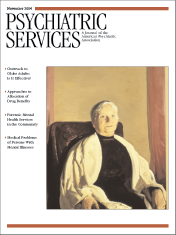Cognitive Dissonance in the Pages of Psychiatric Services
In Reply: The pressure of cost containment is ever increasing, and there is no doubt that providers of substance abuse treatment, like other health care professionals, are being asked to make do with less. The apparent "dissonance," as pointed out by Dr. Masland, between our findings showing that greater quality and quantity of services increase treatment retention and favorable outcomes and Dr. Schreter's column about making do with less highlights the tension between research findings and their implications and implementations in reality, largely driven by budgetary concerns. The challenge is, then, how to deliver effective treatment without increasing the cost of delivering services.
The substance abuse field has continued to struggle with strategies to respond to this challenge, many of which are proposed and described by Dr. Schreter. They include promoting evidence-based treatment approaches, expanding the continuum of care, and integrating services. Nevertheless, findings reported in our article suggest that if we want to achieve certain levels of outcomes in substance abuse treatment, we must provide the amount of high-quality services that will effectively address the diverse problems among substance abusers. Several recent developments in the field are intended to increase the efficiency and effectiveness of treatment with existing resources.
One such development is in the area of patient assessment and patient feedback. Services make the greatest impact if they are received by those who need them most. Therefore, it is critical to assess patients at intake and periodically throughout treatment in order to develop and adjust treatment plans and services. In addition, patients' satisfaction with programs, counselors, and services—a measure of quality discussed in our paper—should be taken into consideration in clinical decisions and practice. Routine collection and consideration of patient feedback can improve treatment retention and outcomes for individuals (1) and potentially for the treatment facility as a whole (personal communication, Forman R, 2004).
Developments in the area of organizational process are also promising. Performance enhancement can be achieved through organizational improvement; for example, according to one estimate, 85 percent of errors in the organization were attributable to how processes are designed (2). Therefore, a better organizational process can improve program performance without having to utilize additional resources.
Extending treatment is another area in which recent developments are making a difference. Based on increasing understanding of the chronic nature of drug dependence, recent reconceptualizing and restructuring of the treatment delivery system have emphasized concepts such as continuity of care and the disease-management model for treating addiction. These treatment models involve sustained support to promote recovery. Positive findings have been shown in studies of posttreatment support in the form of participation in self-help programs and other pro-recovery activities or even as a result of continued monitoring. The health services policy and practice focus has begun to shift from intensive to "extensive" disease management precepts, and we expect that these long-term recovery support or management concepts will continue to emerge.
Although there are ways to improve substance abuse treatment to achieve greater efficiency and effectiveness without increasing funding, policy makers and the public need to recognize the chronic nature of alcohol and drug dependence and strike a balance between short-term savings versus long-term cost.
1. Miller S: Beyond integration: the triumph of outcome over process in clinical practice. Psychotherapy in Australia 10:2–19, 2004Google Scholar
2. Holloway D: Primer on Improvement: How Organizations Improve. Presentation to the Network for the Improvement of Addiction Treatment. Madison, University of Wisconsin. Available at www.pathstorecov ery.orgGoogle Scholar



